| Photojournal
- 22
August 2004
The
mansion, the dyke, and the spit
|
Sunday the 22nd of
August started like an ordinary day.
In other words, I got
up and headed out to Boundary Bay to find shorebirds and photograph
them. My first stop was "the Mansion", a large house
out by the dyke. To get to the mansion, one has to drive along
the dyke for a short ways. Most of the dyke is a public recreational
path and vehicles are not allowed on it, but this part of the
dyke is a road that, amongst other things, leads to the driveway
of the mansion and to the pumping station next to it.
When I arrived, I found
several species of shorebirds, including both types of yellowlegs.
Here they are--the front one (rightmost) is a Greater Yellowlegs,
and the middle one (right behind the Greater) is a Lesser Yellowlegs..
|
|
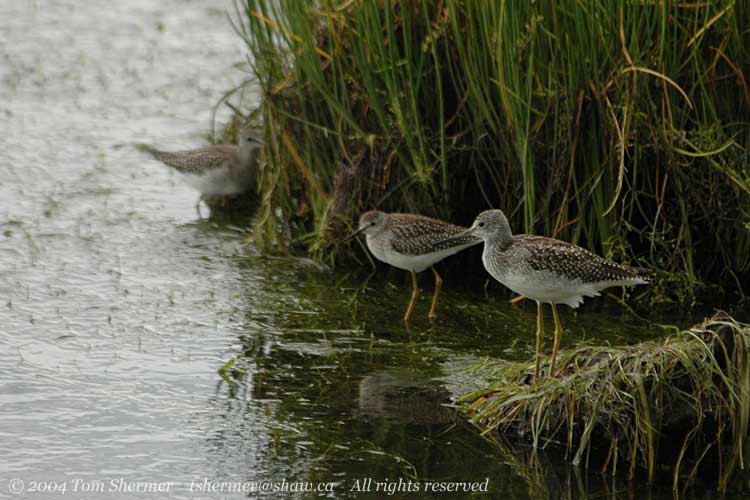 |
|
It's often challenging
to identify shorebirds, especially in photos. Below I've got two
birds, and can't 100% identify either of them. The front bird
is probably a Stilt Sandpiper, although he could be a Pectoral
Sandpiper. The rear bird is either a Lesser or a Greater Yellowlegs,
but based on the size vis-a-vis the sandpiper I think it's a Greater.
Yellowlegs are in a different genus (Tringa) than the Stilt
and Pectoral (Calidris).
(Update: Ilya Povalyaev,
a local birder, confirms that this is a Stilt and a Greater. He
also corrected my misidentification of the birds in the first
photo; I had originallly said that both in-focus birds were Greaters.)
|
|
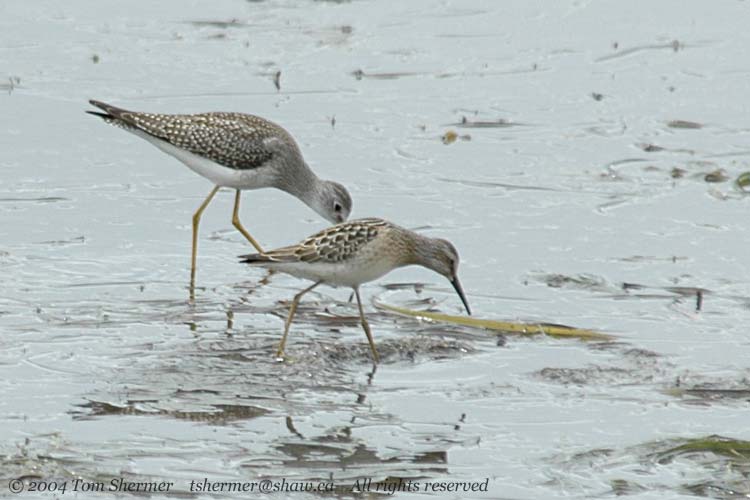 |
|
Now, the following
guy is definitely a Lesser, based on the length of his bill relative
to the size of his head. It looks like he's caught a little something
to eat.
|
|
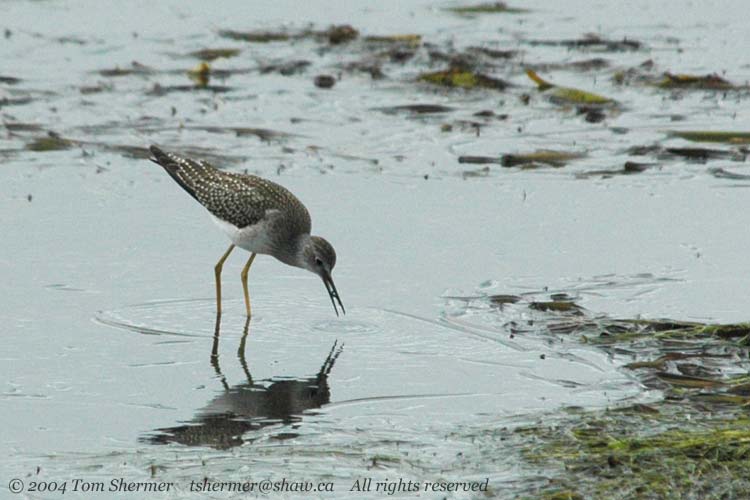 |
|
Also enjoying the Mansion's
ambience were some Long-billed Dowitchers. The left three birds
are the dowitchers, and the bird on the right is a Greater Yellowlegs.
It's hard to see well because of the flattened perspective, but
that yellowlegs is a bit larger than the dowitchers.
|
|
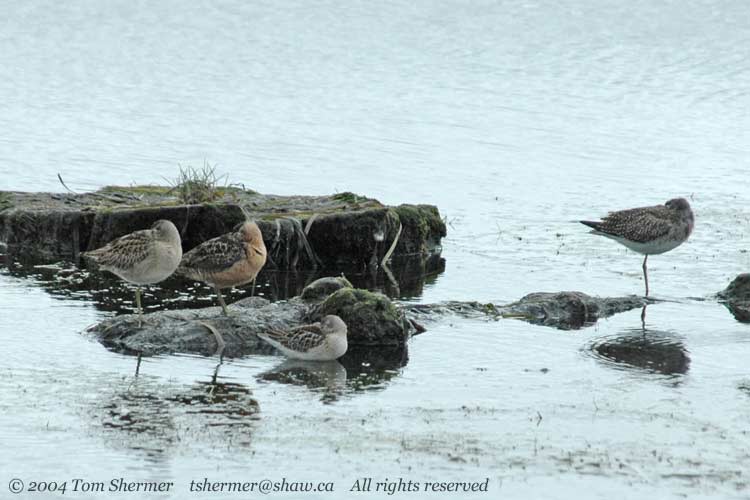 |
|
As you can probably
tell from the photos, it was an overcast day, but a light one,
not a dark one. The Mansion didn't hold much more, so I got in
my car and headed west along Ladner Trunk Road. A little ways
along I turned south to get back to the dyke, by the old airport.
Here's a shot of how
it looked when I got to the dyke. What this photo doesn't show
is the howling wind.
|
|
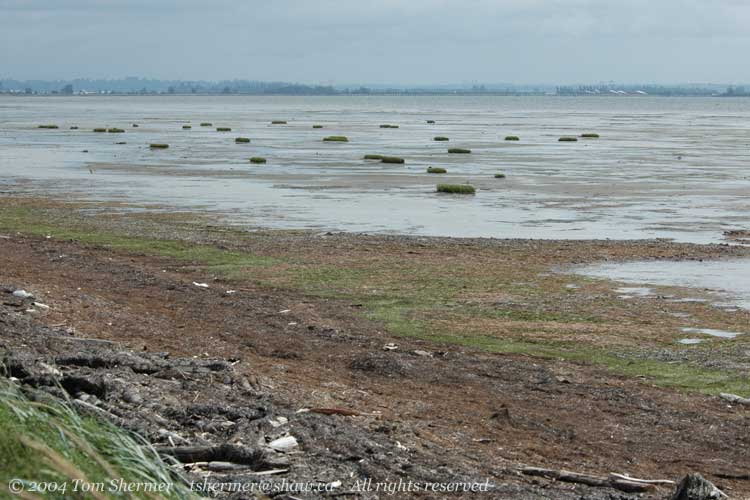 |
|
Athough it looks almost
like half-sunken hay bales in the bay, those are actually little
spots where grass is growing. It seems odd to me that the sides
of each of the patches of grass are vertical. I would expect the
grass to grow diagonally outwards from the sides, forming a proper
clump.But no--that grass is misbehaving.
There were a few Baird's
Sandpipers at this location, near the dyke. They were my first
black-legged shorebird of the day.
|
|
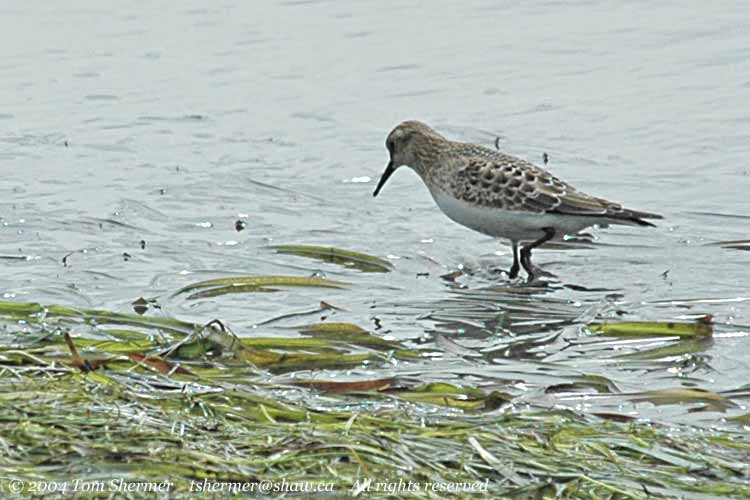 |
|
There was one neat
thing about the stiff wind. Barn Swallows were out in large numbers,
chasing bugs through the air. Normally, Barn Swallows move way
too darned fast to get a good picture of them in flight. These
ones were still were moving fast, but that was windspeed. Since
they were flying against the stiff wind, that meant that their
groundspeed was moderately slow, and with a little practice and
a little luck I could follow them with my camera. So here's a
usually-not-so-easy-to-obtain picture of a Barn Swallow in flight.
|
|
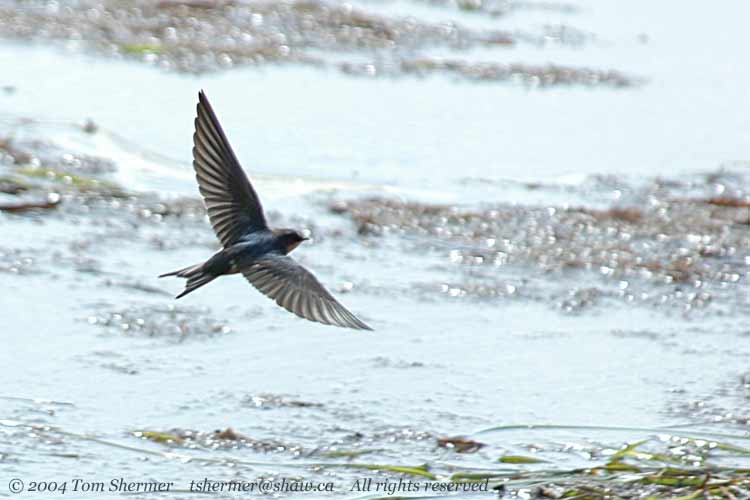 |
| As I was
about to leave this location, I spied a Black-bellied Plover fairly
close in. Here's a photo of him. |
|
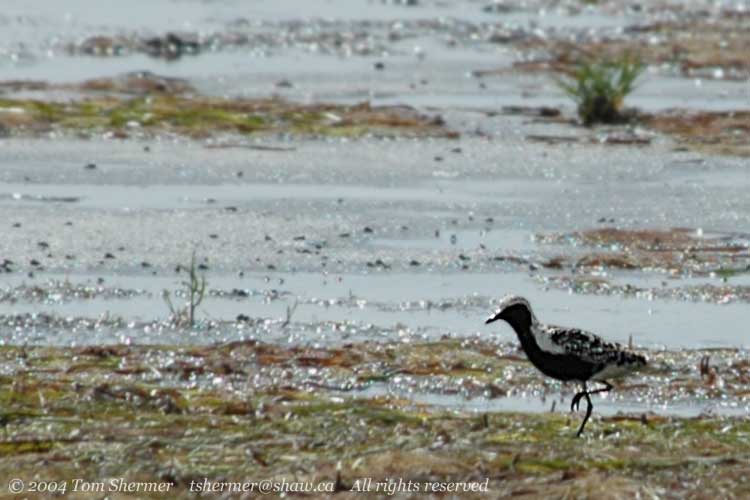 |
|
I had to apply a fair
whack of processing to that photo to get the bird to stand out.
I painted a mask for the bird and sharpened him, and then I applied
a couple of different blurs to the background. The original background
had very sharp water highlights which were competing with the
bird for attention. Blurring made them sit back a bit more.
Once again I got in
my car. This time I headed around to the south side of the Bay,
to the town of Crescent Beach, wherein lies the park known as
Blackie Spit. There I went to check the sheltered part of the
bay, and on the way I found some Gaillardia (a.k.a. Blanket Flowers).
Here's one that's being visited by a bee.
|
|
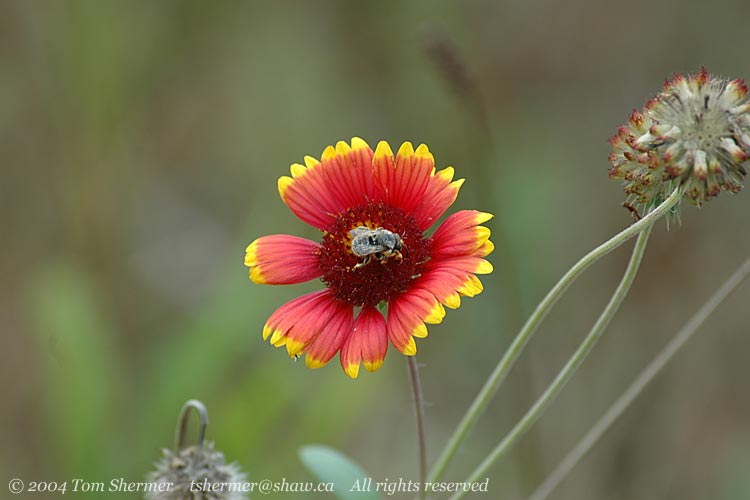 |
|
It was a delight to
find such colorful flowers after spending the morning looking
at the washed-out blues, browns, and blacks of an overcast day
on the bay.
On a little piece of
land in the bay, there were a bunch of Greater Yellowlegs. The
ones I had seen earlier were quite active, but these guys just
wanted to rest.
|
|
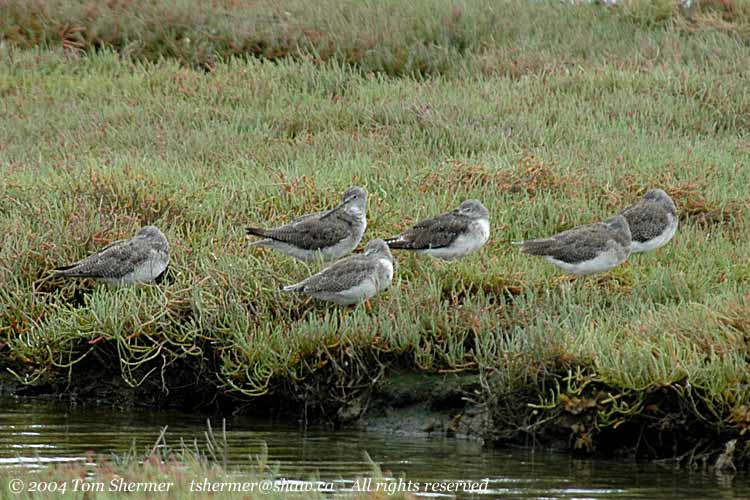 |
|
Heading out towards
the point, I snapped a few pictures of some Ring-Billed Gulls.
If you look closely, you can maybe see his red orbital ring (a
bit of red coloration just at the edge of his eyeslits)..Several
species of gulls have a red orbital ring, but some have purplish,
yellowish, or pinkish orbital rings.
|
|
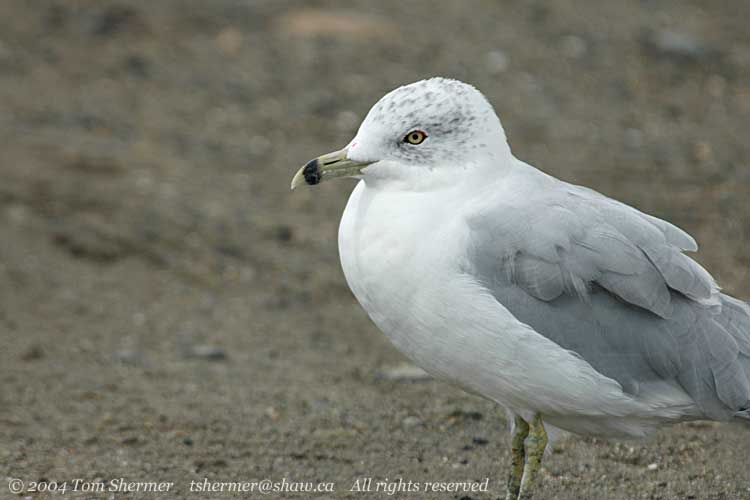 |
|
Rounding the point,
I came upon a Common Loon who was fairly close to shore.
|
|
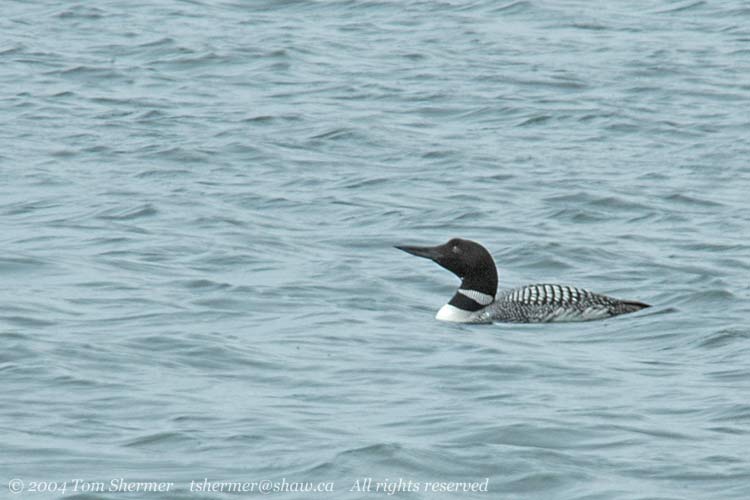 |
| He or she
flapped his or her wings a bit. I'm not sure if this is some sort
of display or if it was merely the loon's way of stretching out
the wings. |
|
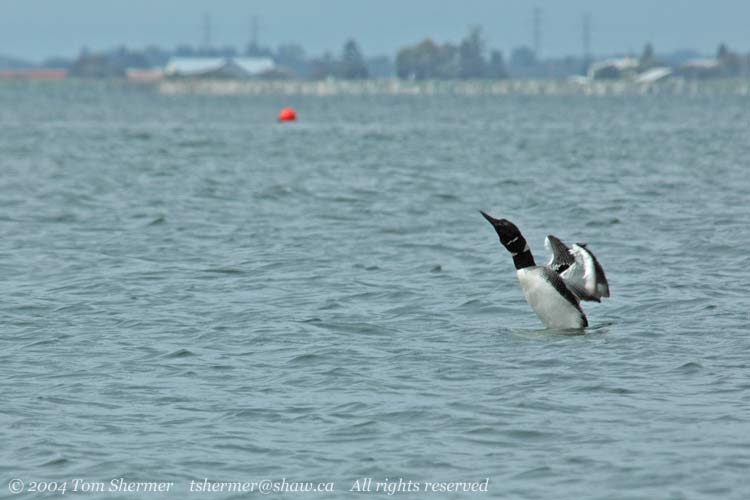 |
| |
|
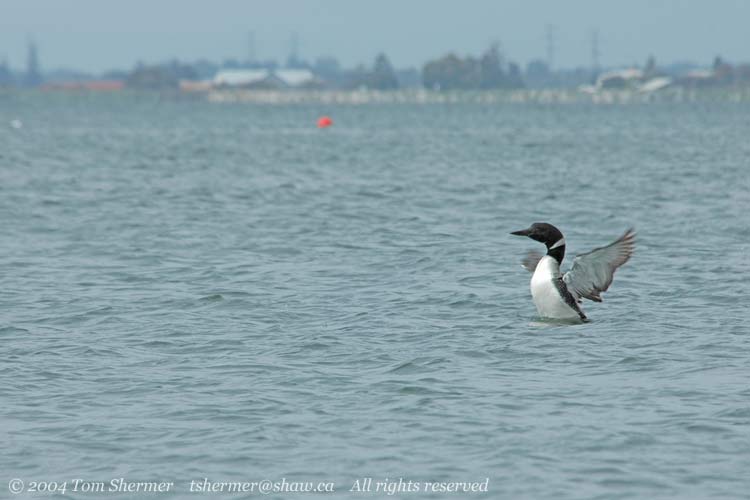 |
|
I wanted to get Loon's-eye-level
photos, as I knew the earlier ones (like the ones above) would
be very much downward-angle photos. So I got on my knees and took
some shots, but that wasn't comfortable and it was still too downwards.
Then I went whole hog and lied down on the beach, head towards
the ocean. Let me tell you, it just doesn't feel right to be on
one's belly and tilted down towards the water. I prefer lying
with head firmly above feet when I'm at the beach.
With one eye watching
the waves to be sure I and my camera didn't get soaked, I took
several photos.. Here's one of them, where I caught the loon and
another one that had shown up while I was shooting.
|
|
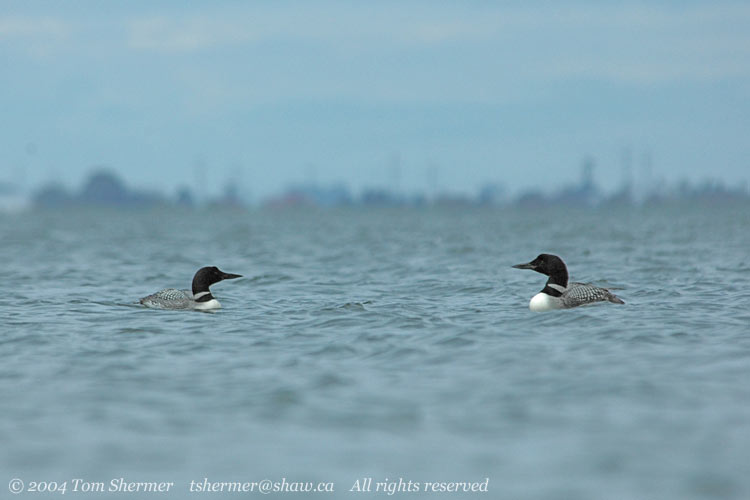 |
|
I didn't get soaked
by waves, but the beach was a bit wet, so I ended up with a cold
and wet-in-spots t-shirt.
It was a quarter to
two in the afternoon already, so I decided to have lunch in Crescent
Beach. I had some fish without the chips and then drove back towards
home in New Westminster. I decided to stop at the local Army &
Navy to look at their tents (I was thinking of getting a tent
to use as a bird blind). I parked in back of the A&N, across
Front Street from their back entrance.
I didn't get a tent.
When I got back to my car, though, I noticed a small flock of
birds on the railroad tracks, bushes, and fence in front of me.
I pulled out my camera and headed over to them (checking for trains
first, of course). They were House Sparrows.
Here's a male, who
was sitting on the railroad track. He's got some worn feathers
and some already replaced by his fall colors. He sang a note or
two; I think it was the opening part of "I've been working
on the railroad..."
|
|
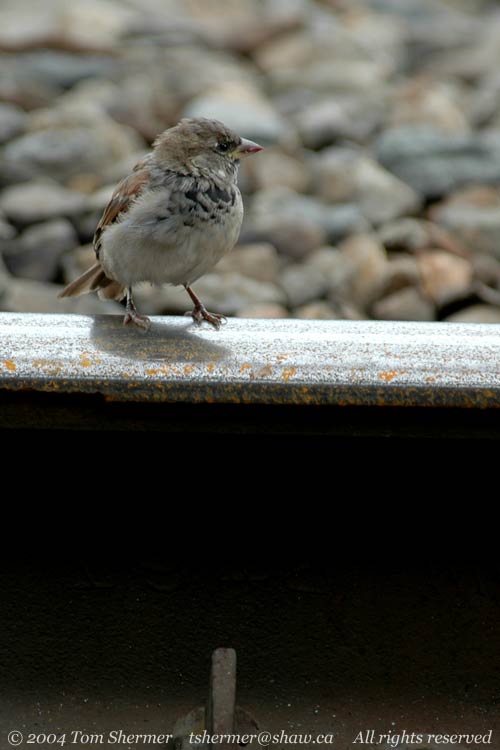 |
| Here's a
pair of the House Sparrows. On the left is another molting male,
and on the right is a female. |
|
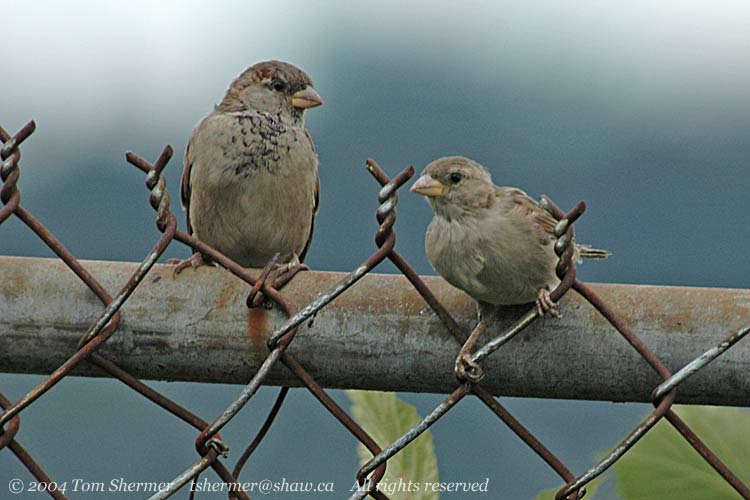 |
| Never having
been to this particular point in the tracks before, I shot a few
railroad-track photos. |
|
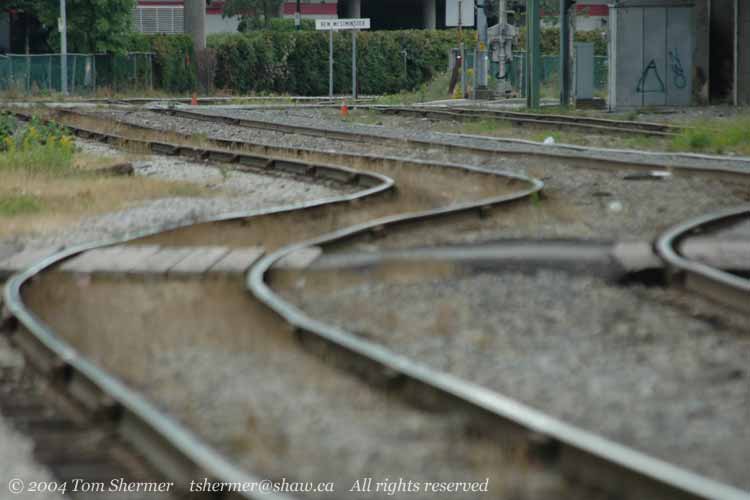 |
| On returning
to my car, I noticed an old Chevy sedan parked a couple of stalls
down, and got a few shots of it and its grille. |
|
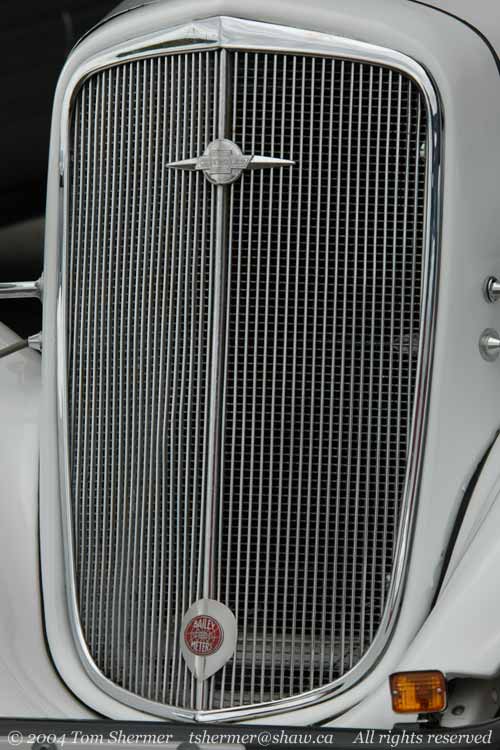 |
|
I was tired, though,
and didn't give it the full photo treatment that I would have
if I had encountered it earlier in the day.
Coming up next time...no
shorebirds!
Your not-so-common
loon,
Tom
|
|
|